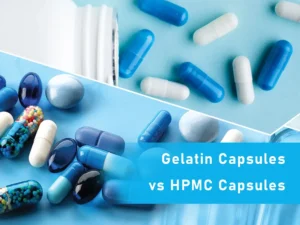Introduction
You may know that capsules are one of the prominent forms of supplements and drugs. They allow for easy swallowing, have higher absorption of drugs or supplements, and are customizable.
Gelatin and HPMC capsules are the two primary capsule types as of today. Throughout the years, gelatin capsules have been the favored option for capsule shells. In recent times, the demand for plant-based capsules like HPMC capsules has risen considerably.
We’ll thoroughly explore these two capsule variants and their principal differences here. Lastly, we’ll provide valuable guidance on what capsule type to choose for your needs.
What are Gelatin Capsules?
Gelatin capsules are the widely used and favored choice of available capsule shells. They are comprised of a protein known as gelatin. It’s typically made from animal-based collagen from bovine or pork sources.
In particular, bovine hide is the best-known choice for these capsules. It allows the capsules to be Halal and Kosher-certified. The purpose is to fulfill the dietary and religious requirements of far-reaching consumers.
The protein gelatin has been used for over a century to manufacture capsules. The design of the two-piece gelatin capsule was patented in 1847. Since then, it has been extensively used in the pharmaceutical industry. Today, gelatin capsules are the most prevalent capsule type employed in the industry.
Types of Gelatin Capsules
There exist two types of these capsules. These are:
- Hard Gelatin Capsules: These capsules comprise a rigid shell. The outer shell of such capsules can retain its shape even under pressure. It can encapsulate granules, dry powders, and solids effectually.
- Soft Gelatin Capsules: These are thicker in contrast to hard gelatin capsules. Soft gelatin capsules are less rigid. They further need added ingredients like glycerin to get their soft texture. They are perfect for encapsulating liquid or semi-solid formulations.
Salient Features and Benefits of Gelatin Capsules
Some noteworthy and salient features and benefits of these capsules include:
1. Easier to Consume
Owing to their smooth texture, such capsules are easier for some to take in. They can also hide any awful taste from the supplement or drug inside the capsules.
Furthermore, custom flavors can be added to these capsules. It also aids in masking the taste and smell of an encapsulated supplement or a drug. Thus, it’s much more fitting for the consumers.
For example, the taste of fish oils can be awful. As it provides many benefits, it is more convenient to take it in gelatin capsule form.
2. Easy to Digest
Such capsules allow for easy digestion. They dissolve shortly after getting into the stomach for digestion. That ensures an encapsulated supplement or drug won’t pass a consumer’s digestive system without absorption.
3. Flexibility and versatility
Gelatin capsules are prominently recognized for being versatile and flexible. It’s because they can encapsulate varying substances depending on the capsule variant (hard and soft). These include:
- Liquids
- Powders
- Semi-solids
Along with that, gelatin capsules provide varied customization options. Their varying colors, shapes, and sizes can be fabricated to fulfill specific product needs.
4. Recognized as Safe
The protein gelatin is designated as GRAS (Generally Recognized as Safe). It’s by most of the world’s regulatory authorities for human food and pharmaceutical consumption.
Moreover, it is wholly natural and doesn’t contain GMOs (genetically modified organisms). It’s also allergen-free.
5. Cost-effectiveness
The production of gelatin capsules is largely cost-effective. It’s at least 30% less than other alternatives. It’s because such capsules have an approved and reliable production process. Thus, the cost of fabricating gelatin shells is relatively low.
What are HPMC capsules?

HPMC is short for hydroxypropyl methylcellulose and is also known worldwide as Hypromellose.
HPMC has become a thriving alternate material for two-piece capsules. It’s used for supplements globally, especially in the UK, North America and Europe.
As you can see, HPMC is a cellulose derivative acquired from plant sources. These include wood pulp or cotton fibers. Thus, HPMC is a tasteless, clear material especially fitting for vegans and vegetarians.
That makes HPMC capsules an ideal alternative to gelatin capsules. Plus, these are further Halal and Kosher-certified. That also makes them fitting for consumers with religious dietary limitations. They also don’t comprise any animal-derived ingredients.
These capsules were initially developed in 1989 as a substitute for hard gelatin capsules. Since then, they have attained a considerable market share in the worldwide empty capsule industry.
Salient Features and Benefits of HPMC Capsules
As stated before, these capsules are vegan- and vegetarian-friendly alternatives to gelatin capsules. Some of their prominent features and benefits are:
1. Easy and Comfortable to Swallow
An HPMC capsule is slippery and smooth, which makes it comfortable and easy to swallow. Its risk of sticking in the mouth or throat is lower than other capsule types.
That makes swallowing capsules or pills easier for individuals who find it problematic.
- Safe and Non-Toxic
The HPMC polymer used to make such capsules is biocompatible. Consequently, it doesn’t result in unfavorable effects when making contact with the human body. Such capsules dissolve quickly in the stomach, typically in 5-10 minutes.
Furthermore, such capsules are devoid of allergens, preservatives, and gluten, making them safe.
3. Customization Options
Such capsules are customizable to fulfill distinct product requirements. They come in differing sizes, colors, and designs. That enables supplement manufacturing companies to adapt to their product needs.
4. Persistent and Resistant to Moisture
An HPMC capsule is persistent and resistant to moisture. That makes it a perfect option to encapsulate moisture-sensitive substances. It also has a low moisture content, which lessens the degradation or spoilage risk of ingredients. It also aids in upholding the required product potency and quality over a prolonged period.
5. Versatile and Flexible
These capsules are versatile and flexible, allowing for encapsulating solid and liquid materials. They can encapsulate a diverse range of ingredients, some of which include:
- Vitamins and minerals
- Herbs
- Pharmaceuticals
They are also ideal for encapsulating sensitive ingredients that may react with other encapsulation substances.
Key differences between Gelatin and HPMC capsules
Both gelatin and HPMC are prevalent materials used to make nutritional supplements capsules. While their motive is similar, there are some integral differences between these two capsule variants. The following table denotes some noteworthy differences between gelatin and HPMC capsules:
| Factor | Gelatin Capsules | HPMC Capsules |
| Source | Made from animal-based gelatin that’s extracted from the skin and bones of pork and bovine | Made from HPMC or Hypromellose (a plant-based polymer) that’s derived from cellulose |
| Suitability for vegetarians and vegans | Not suitable | Suitable |
| Suitability for consumers with religious dietary restrictions | Those derived from bovine sources are considered Halal and Kosher-certified. While those from pork sources are not considered Halal and Kosher-certified | Halal and Kosher-certified |
| Dissolution rate | Typically dissolve slower | Typically dissolve faster |
| Gel strength
|
High, with the capability to create a more rigid and harder capsule shell | Low, with the capability to be more flexible |
| Production cost | Significantly less expensive to produce | More expensive to produce |
| Usage in supplement manufacturing and pharmaceutical industry worldwide | Most common | More common |
| Usefulness for moisture-sensitive formulations | Less useful | More useful |
| Stability in high temperature or high humidity conditions | Not Stable | Stable |
Choose the right capsule for your needs
The choice between these two capsule types depends on your preferences and necessities. In this context, there are some noteworthy factors to contemplate when making a wise decision. These are:
Restrictions to diet
As mentioned before, you may be following a vegan or vegetarian diet. In that case, HPMC capsules are the best choice as they come from plant-based sources.
Besides, these capsules are also a better choice if you have religious dietary restrictions.
Cost
As you can see, HPMC capsules are pricier than gelatin capsules. Yet, the cost may differ based on the particular supplier and product.
Thus, if your primary need is the cost-effectiveness of the capsules, then gelatin capsules are better.
Durability
In terms of durability, HPMC capsules are better. It’s because they tolerate greater humidity, moisture, and heat than gelatin capsules.
Both capsule variants have a shelf life of 5 years under recommended conditions. You can keep gelatin capsules at a recommended temperature range of 15-25°C. They can also be kept at a recommended relative humidity range of 35-65%. Meanwhile, HPMC capsules can be kept at 15-30°C and 35-70% relative humidity range.
Thus, an HPMC capsule is better in terms of durability and temperature and humidity tolerance.
Also, such capsules seem better for options with ingredients with high acidity and alkalinity. In contrast, gelatin capsules may break down under these conditions.
The shift towards natural, vegetable-based capsules
Gelatin capsules remain the favored choice for supplement and pharmaceutical industries. In the coming years, these capsules will continue to be relatively popular.
Despite this, more consumers are demanding “natural” and plant-based products. Thus, HPMC capsules are gaining traction among consumers as a natural alternative to gelatin capsules worldwide.
Conclusion
By now, you must have grasped a thorough understanding of gelatin capsules and HPMC capsules.
We elaborated on these two capsule types in detail, along with their prominent differences. We also provided essential guidance as to what capsule type to choose.
To conclude, both are excellent and widely known choices in their ways. Before selecting one, consider factors like dietary and religious restrictions, durability, and costs.

